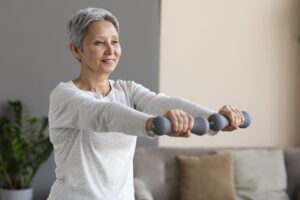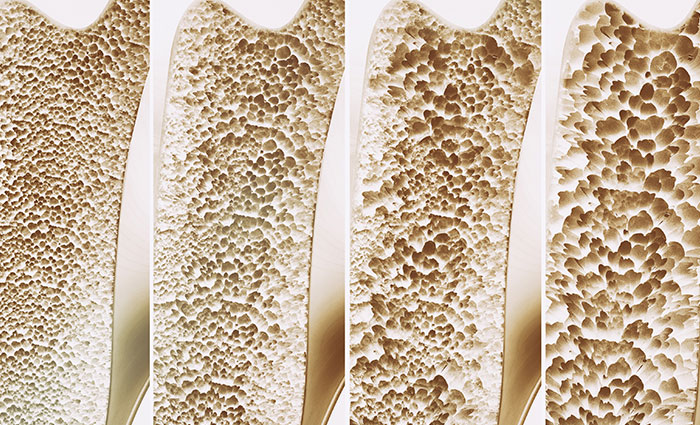Osteoporosis can affect anyone, at any age. But as we grow older, we’re more susceptible. The old unfunny joke about “breaking a hip” is actually quite common and often due to underlying osteoporosis. Broken bones at an older age can often cause a domino effect of health issues.
Up to 70% of people who encounter broken bones or fractures are over 65 years of age. What can we do about it if we have it and better yet, how can we prevent it?
Table of Contents
4 Important Things to Know About Osteoporosis
What is Osteoporosis?
As defined by Johns Hopkins Medicine, “Osteoporosis, literally “porous bone,” is a disease that thins the framework inside bones so much that even a minor fall or bump against a car door or piece of furniture may cause a fracture. A break can happen at any spot on your skeleton, but fractures of the wrist, hip and spine are among the most common.”
Who is at risk?
Often times, we only think about older folks having osteoporosis, but that isn’t the case. We know that post-menopausal women are also high risk, but who else could osteoporosis affect?
- Persons who have a history of cigarette or alcohol abuse
- Persons who have had a history of anorexia nervosa or extremely low body weight
- Persons with Rheumatoid Arthritis
- Persons taking certain medications, such as corticosteroids, certain anti-seizure medications, certain blood thinners or proton-pump inhibitors (anti acid reflux medication)
Osteoporosis affects females and males alike, although we often hear about it when referring to women.
Prevention
It’s said that “An ounce of prevention is worth a pound of cure”. What are some of the things we can do at any age to prevent or to prevent the worsening of osteoporosis?
Make sure you’re getting enough calcium. Most doctors recommend between 1,000 to 1,200 milligrams daily, depending on age and risk factors. *Speak with your doctor for what is the best dosage for you. Calcium can be taken as a supplement or by adding calcium rich foods to your diet. Some of these foods would be milk or yogurt, beans or calcium enriched cereals or orange juice.
Appropriate Vitamin D levels. Vitamin D assists with calcium absorption into the bones. Some people are able to get sufficient levels included in their diet and in their activity spent outdoors in the sun. *Check with your doctor as to the appropriate levels for you, taking into consideration your diet, where you live and how much time you spend in the sun.
Reduce caffeine and quit smoking. Regular, heavy consumption of coffee, soda or other caffeine products can affect bone density, as can long term cigarette use.
Exercise, especially working with weight bearing modalities. “Weight-bearing exercise” can conjure images of body builders, but in reality, it’s much simpler than that. It means any exercise in which we’re putting weight loads on our muscles. This could be walking, jogging or dancing (body weight). Yes, it can a routine of light weights (even for chair or bedbound patients), but would also include things like training on an elliptical machine or even gardening.
While balance exercises, such as Tai Chi or Yoga won’t affect your bone density, they will help to increase your coordination and balance. Improving both can lead to less falls and injuries in the future.

Diagnosis and Treatment
When should you begin to think about osteoporosis? If you fit into any of the high risk categories above, speak with your doctor about your concerns. Your doctor may suggest a bone scan to see how your current bone density looks.
Bone density tests/scans are usually recommended if:
- You are over 70 years of age
- You are a female over the age of 65
- You have experienced a loss of height
- You have had a fractured bone and you’re over 50 years old
Treatment can vary according to your risk factors. Treatment ranges from modifying risks from falls, the prevention items mentioned above or medication or hormone therapy.
~ ~ ~
Do you have questions about how you can better support your loved one while they age in place in South Florida or regarding homecare in general? Please contact CareGivers of America here: Contact or call us toll free: 800-342-4197
*No information in this article is to be taken as medical advice. This post is not sponsored, but may contain external links to websites, articles or product examples. External links are used for example or refence purposes only and these links do not indicate specific product or website endorsement by CareGivers of America.



